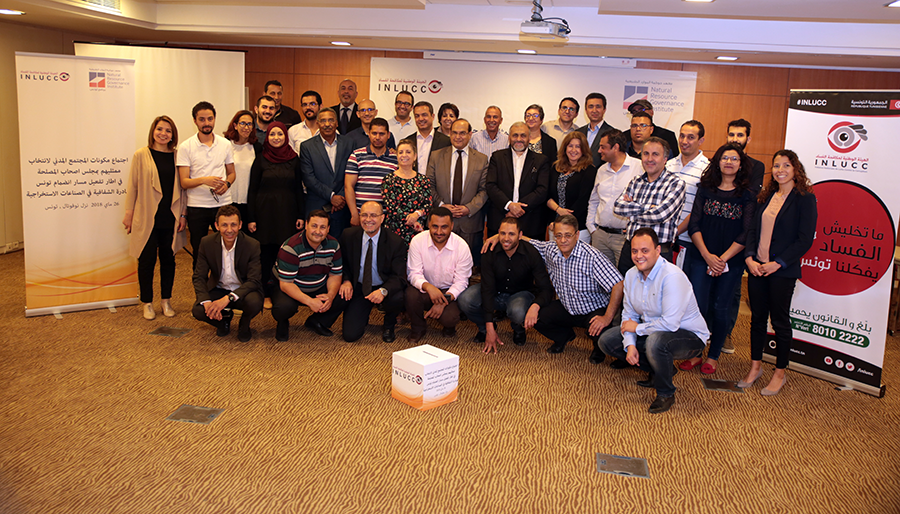
Civil Society Helps Tunisia Toward a Multi-stakeholder Approach in Extractives Governance
Continued social tensions around Tunisian natural resources highlight the urgent need to improve trust in and reform the country’s extractives sector. To that end, the Natural Resource Governance Institute (NRGI) has worked with various Tunisian stakeholders to increase awareness of and appetite for the country’s accession to and implementation of the Extractive Industries Transparency Initiative (EITI). Governance and transparency tools such as EITI are capable of providing multi-stakeholder platforms for joint reform in Tunisia’s phosphate and oil and gas industries.
The Tunisian government recently formally committed joining EITI and called on civil society organizations (CSOs) to elect their representatives in EITI’s multi-stakeholder group (MSG); such groups are customary in implementing countries and bring together government, industry and civil society. The Tunisian Anti-Corruption Authority (INLUCC) then held those elections on May 26. The elections represent a seminal gain for civil society actors, whose persistent mobilization and advocacy have greatly contributed to a number of important transparency and governance reforms in the country’s extractives sector.
A lack of dialogue and consensus among stakeholders has significantly slowed reform in post-revolutionary Tunisia. Accordingly, a multi-stakeholder approach instills trust via dialogue and facilitates joint action. The head of INLUCC, Chawki Tabib, stated in his keynote speech at the election meeting that “coordinating efforts is paramount” given that the “lack of national coordination between stakeholders is a problem facing anti-corruption and governance work.” The MSG election process represents an important step toward institutionalizing multi-stakeholder debate and consultative reform.
The success and legitimacy of the elections are the product of years of civil society advocacy, combined with INLUCC’s efforts to put in place a rigorous, credible and inclusive electoral process. As Diana al Kaissy, former Publish What You Pay coordinator for the Middle East and North Africa and EITI expert observed: “The election process was reflective of international best practices. The oversight body was impartial and independent, and all the elected CSO representatives are well versed in oil and gas transparency issues.” The elections resulted in the appointment of five activists: four representing the Tunisian Coalition of Transparency in Energy and Mines (CTTEM) and a representative of Tunisian watchdog organization I-Watch.
What’s next?
Continued success of Tunisia’s efforts to institutionalize natural resource transparency is contingent on the following actions:
MSG CSO representatives must identify priorities and develop effective coordination and communication strategies
Manel Ben Achour, I-Watch’s executive director and an MSG CSO representative, emphasized the need for “CSOs to organize and set a good example within the MSG and nationally.” For that to happen, she argues that, “it is important for us to establish our priorities and recommendations for the action plan.”
In order for CSO priorities to truly represent civil society needs and interests, emphasis must be placed on establishing a rigorous communication strategy. According to appointee Aymen Latrash, he and his fellow elected CSO representatives are aware that “communication with the wider civil society is one of the biggest challenges facing MSGs.” Elected representatives are therefore ready to capitalize on their respective organizations’ experience, reach and geographic placement to ensure their messaging is informed by and reflective of various local issues. For instance, Latrash aims to use his network across “at least the three [hydrocarbon] producing regions of Medenine, Tataouine and Kebili to directly communicate with local civil society actors.” As a youth-led organization with national popularity and expansive reach, I-Watch plans on “establishing partnerships with regional media outlets, as well as using social media to reach out to youth across the country using their own language.”
The development of a context-sensitive multi-stakeholder work plan
Elected CSO representatives must strike a careful balance: they need to ensure that their work plan meets minimal EITI requirements while also ensuring that it is informed by the specific Tunisian context. Latrash is determined to use his position within the MSG to “voice the needs and interests of my region.” Similarly, Ben Achour reiterated that “I-Watch plans on capitalizing on the combination of our experience in natural resource governance projects and our representation across our six regional offices to contribute to a context-sensitive work plan.” The first test of the MSG approach will be creating an EITI work plan that is unanimously approved.
Hanen Keskes is the Middle East and North Africa regional associate at the Natural Resource Governance Institute (NRGI).
The Tunisian government recently formally committed joining EITI and called on civil society organizations (CSOs) to elect their representatives in EITI’s multi-stakeholder group (MSG); such groups are customary in implementing countries and bring together government, industry and civil society. The Tunisian Anti-Corruption Authority (INLUCC) then held those elections on May 26. The elections represent a seminal gain for civil society actors, whose persistent mobilization and advocacy have greatly contributed to a number of important transparency and governance reforms in the country’s extractives sector.

A lack of dialogue and consensus among stakeholders has significantly slowed reform in post-revolutionary Tunisia. Accordingly, a multi-stakeholder approach instills trust via dialogue and facilitates joint action. The head of INLUCC, Chawki Tabib, stated in his keynote speech at the election meeting that “coordinating efforts is paramount” given that the “lack of national coordination between stakeholders is a problem facing anti-corruption and governance work.” The MSG election process represents an important step toward institutionalizing multi-stakeholder debate and consultative reform.
The success and legitimacy of the elections are the product of years of civil society advocacy, combined with INLUCC’s efforts to put in place a rigorous, credible and inclusive electoral process. As Diana al Kaissy, former Publish What You Pay coordinator for the Middle East and North Africa and EITI expert observed: “The election process was reflective of international best practices. The oversight body was impartial and independent, and all the elected CSO representatives are well versed in oil and gas transparency issues.” The elections resulted in the appointment of five activists: four representing the Tunisian Coalition of Transparency in Energy and Mines (CTTEM) and a representative of Tunisian watchdog organization I-Watch.
What’s next?
Continued success of Tunisia’s efforts to institutionalize natural resource transparency is contingent on the following actions:
MSG CSO representatives must identify priorities and develop effective coordination and communication strategies
Manel Ben Achour, I-Watch’s executive director and an MSG CSO representative, emphasized the need for “CSOs to organize and set a good example within the MSG and nationally.” For that to happen, she argues that, “it is important for us to establish our priorities and recommendations for the action plan.”
In order for CSO priorities to truly represent civil society needs and interests, emphasis must be placed on establishing a rigorous communication strategy. According to appointee Aymen Latrash, he and his fellow elected CSO representatives are aware that “communication with the wider civil society is one of the biggest challenges facing MSGs.” Elected representatives are therefore ready to capitalize on their respective organizations’ experience, reach and geographic placement to ensure their messaging is informed by and reflective of various local issues. For instance, Latrash aims to use his network across “at least the three [hydrocarbon] producing regions of Medenine, Tataouine and Kebili to directly communicate with local civil society actors.” As a youth-led organization with national popularity and expansive reach, I-Watch plans on “establishing partnerships with regional media outlets, as well as using social media to reach out to youth across the country using their own language.”
The development of a context-sensitive multi-stakeholder work plan
Elected CSO representatives must strike a careful balance: they need to ensure that their work plan meets minimal EITI requirements while also ensuring that it is informed by the specific Tunisian context. Latrash is determined to use his position within the MSG to “voice the needs and interests of my region.” Similarly, Ben Achour reiterated that “I-Watch plans on capitalizing on the combination of our experience in natural resource governance projects and our representation across our six regional offices to contribute to a context-sensitive work plan.” The first test of the MSG approach will be creating an EITI work plan that is unanimously approved.
Hanen Keskes is the Middle East and North Africa regional associate at the Natural Resource Governance Institute (NRGI).
Authors

Hanen Keskes
Middle East and North Africa Senior Officer